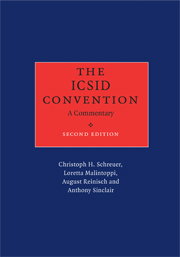Book contents
- Frontmatter
- Contents
- Foreword by Professor Sir Elihu Lauterpacht, CBE, QC
- Authors' preface to the second edition
- Table of cases
- List of abbreviations
- Text of the ICSID Convention
- Procedural calendar
- PREAMBLE
- CHAPTER I International Centre for Settlement of Investment Disputes
- CHAPTER II Jurisdiction of the Centre
- Article 25 Jurisdiction
- Article 26 Exclusive Remedy
- Article 27 Diplomatic Protection
- CHAPTER III Conciliation
- CHAPTER IV Arbitration
- CHAPTER V Replacement and Disqualification of Conciliators and Arbitrators
- CHAPTER VI Cost of Proceedings
- CHAPTER VII Place of Proceedings
- CHAPTER VIII Disputes between Contracting States
- CHAPTER IX Amendment
- CHAPTER X Final Provisions
- Final Clause
- Consolidated bibliography
- Index by article
- Index by subject
Article 26 - Exclusive Remedy
from CHAPTER II - Jurisdiction of the Centre
Published online by Cambridge University Press: 07 September 2010
- Frontmatter
- Contents
- Foreword by Professor Sir Elihu Lauterpacht, CBE, QC
- Authors' preface to the second edition
- Table of cases
- List of abbreviations
- Text of the ICSID Convention
- Procedural calendar
- PREAMBLE
- CHAPTER I International Centre for Settlement of Investment Disputes
- CHAPTER II Jurisdiction of the Centre
- Article 25 Jurisdiction
- Article 26 Exclusive Remedy
- Article 27 Diplomatic Protection
- CHAPTER III Conciliation
- CHAPTER IV Arbitration
- CHAPTER V Replacement and Disqualification of Conciliators and Arbitrators
- CHAPTER VI Cost of Proceedings
- CHAPTER VII Place of Proceedings
- CHAPTER VIII Disputes between Contracting States
- CHAPTER IX Amendment
- CHAPTER X Final Provisions
- Final Clause
- Consolidated bibliography
- Index by article
- Index by subject
Summary
INTRODUCTION
Art. 26 is the clearest expression of the self-contained and autonomous nature of the arbitration procedure provided for by the Convention. Unlike Art. 25, it only applies to arbitration but not to conciliation.
The first sentence of Art. 26 has two main features. The first is that, once consent to ICSID arbitration has been given, the parties have lost their right to seek relief in another forum, national or international, and are restricted to pursuing their claim through ICSID. This principle operates from the moment of valid consent. This exclusive remedy rule of Art. 26 is subject to modification by the parties. The phrase “unless otherwise stated” in the first sentence gives the parties the option to deviate from it by agreement.
The second feature of Art. 26, first sentence, is that of non-interference with the ICSID arbitration process once it has been instituted. The principle of noninterference is a consequence of the self-contained nature of proceedings under the Convention. The Convention provides for an elaborate process designed to make arbitration independent of domestic courts. Even in the face of an uncooperative party, ICSID arbitration is designed to proceed independently without the support of domestic courts.
- Type
- Chapter
- Information
- The ICSID ConventionA Commentary, pp. 348 - 413Publisher: Cambridge University PressPrint publication year: 2009

